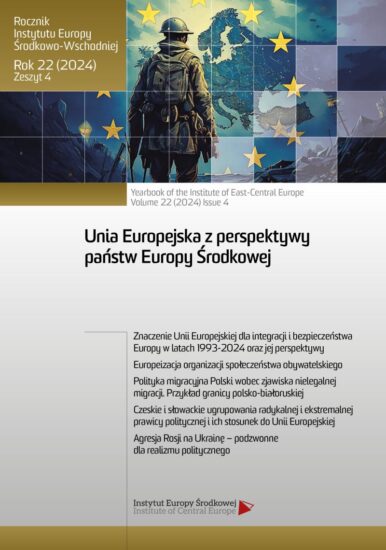ORCID: Paweł Kamiński: 0000-0001-7874-3005
Afiliacja: Polska Akademia Nauk
ORCID: Szczepan Czarnecki: 0000-0002-1363-194X
Afiliacja: Instytut Europy Środkowej, Pol
Pages: 27-43
Edition: Lublin 2024
DOI: https://doi.org/10.36874/RIESW.2024.4.2
Citation method: P. Kamiński, S. Czarnecki, Europeizacja organizacji społeczeństwa obywatelskiego, „Rocznik Instytutu Europy Środkowo-Wschodniej” 22 (2024), z. 4: Unia Europejska z perspektywy państw Europy Środkowej, s. 27-43, DOI: https://doi.org/10.36874/RIESW.2024.4.2
Keywords:Europa Środkowa, europeizacja
Keywords: Central Europe, Europeanization, Organized Interest Groups
Abstract: Organized interest groups and advocacy organizations in democratic states play a crucial role in shaping public policies and influencing the final form of development models implemented. Individual public policies are created and executed both at the national level and within the framework of the European Union (EU). Simultaneously, the process of European integration has led to an increased transfer of competencies from the national to the European level. Consequently, interest groups aiming to maintain influence over legislation cannot rely solely on access to national public policy channels; they must also invest resources in lobbying at the European level. Therefore, the goal of this analysis is to explore whether and how organized interest groups from selected Central and Eastern European countries are subject to Europeanization pressure.
Bibliography:
1. Allern E. H., Otjes S., Poguntke T., Hansen V., Marshall D., Saurugger S., Conceptualizing and measuring party-interest group relationships, „Party Politics” 2020, nr 27 (6), s. 1254-1267.
2. Beyers J., Kerremans B., Critical resource dependencies and the Europeanization of domestic interest groups, „Journal of European Public Policy” 2007, nr 14 (3), s. 460-481.
3. Binderkrantz A. S., Rasmussen A., Comparing the domestic and the EU lobbying context: perceived agenda-setting influence in the multi-level system of the European Union, „Journal of European Public Policy” 2015, nr 22 (4), s. 552-569.
4. Börzel T. A., When Europeanization Hits Limited Statehood. The Western Balkans as a Test Case for the Transformative Power of Europe, „KFG Working Papers” 2011, nr 30, s. 3-18.
5. Bulmer S., Theorizing Europeanization, [w:] Europeanization, P. Graziano, M.P. Vink, (red.), London 2008.
6. Cekik A., Adapting to Europe? Business Interests and Civil Society Groups in Accession Countries, „West European Politics” 2017, nr 5 (40), s. 1066-1087.
7. Cohen I. L., Arato A., Civil Society and Political Theory, Cambridge 1992.
8. Comission of the Euroean Communities, TOWARDS THE ENLARGED UNION Strategy Paper and Report of the European Commission on the progress towards accession by each of the candidate countries, Brussels 2002.
9. Crepaz M., Hanegraaff M., The funding of interest groups in the EU: are the rich getting richer?’, „Journal of European Public Policy” 2020, nr 27 (1), s. 102-121.
10. Czarnecki S., Piotrkowska E., Interest Groups and Political Parties in Central and Eastern Europe, „Interest Groups & Advocacy” 2021, nr 10 (4), s. 376-398.
11. De Bruycker I., Framing and advocacy: A research agenda for interest group studies, „Journal of European Public Policy” 2016, nr 24 (5), s. 775-787.
12. Dür A., Mateo G., The Europeanization of interest groups: Group type, resources and policy area, „European Union Politics” 2014, nr 15 (4), s. 572-594.
13. Featherstone K., Radaelli C. M., The Politics of Europeanization, Oxford 2003.
14. Flockhart T., Europeanization or EU-ization? The Transfer of European Norms across Time and Space, „Journal of Common Market Studies” 2010, nr 48 (4), s. 787-810.
15. Greenwood J., The lobby regulation element of the European Transparency Initiative: Between liberal and deliberative models of democracy, „Comp Eur Polit” 2012, nr 9, s. 317-343.
16. Howard M. D., The Weakness of Civil Society in Post-Communist Europe, Cambridge 2003.
17. Hussein K., Conclusion: The National Co-ordination of EU Policy: Confronting the Challenge, [w:] The National Co-ordination of EU Policy: The Domestic Level, K. Hussein Kassim, G. Peters, V. Wright (red.), Oxford 2000.
18. Kamiński P., Filling the blanks. Political parties, interest groups, and representation of civil society, [w:] Exploring Organized Interests in Post-Communist Policy-Making, M. Dobbins, R. Riedel (red.), London 2021.
19. Kaminski P., It Is All About Money! What Drives Interest Groups’ Relations with Political Parties in Central and Eastern Europe?, „Political Studies Review” 2022, nr 21 (2), s. 321-339.
20. Kanol D., Europeanization of domestic interest groups, „Interest Groups & Advocacy” 2016, nr 5, s. 165-171.
21. Klüver H., Measuring interest group influence using quantitative text analysis, „European Union Politics” 2009, nr 10 (4), s. 535-549.
22. Ladrech R., Europeanization and Political Parties: Towards a Framework for Analysis, „Party Politics” 2002, nr 8 (4), s. 17.
23. Makowski G., Rozwój sektora organizacji pozarządowych w Polsce po 1989 r., „Obywatelstwo i Społeczeństwo Obywatelskie w Polsce” 2015, nr 4 (44), s. 57-85.
24. Otjes S., Rasmussen A., The Collaboration Between Interest Groups and Political Parties in Multi-party Democracies: Party System Dynamics and the Effect of Power and Ideology, „Party Politics” 2017, nr 23 (2), s. 96-109.
25. Pérez-Solórzano Borragán N., EU Accession and Interest Politics in Central and Eastern Europe, „Perspectives on European Politics and Society” 2004, nr 5 (2), s. 243-272.
26. Potluka O., Špaček M., Remr J., Non-governmental Organizations as Partners: Obstacles in the EU Cohesion Policy?, „Ekonomický časopis” 2017, nr 65, s. 715-736.
27. Radelli C. M., Policy transfer in the European Union, „Governance” 2000, nr 13 (1), s. 25-43.
28. Riedel R., Riedel R., Europeizacja – koncepcje i agenda badawcza, [w:] Europeizacja – mechanizmy, wymiary, efekty, R. Riedel, A. Pacześniak (red.), Oslo-Toruń-Wrocław 2010.
29. Sanchez Salgado R., Rebalancing EU Interest Representation? Associative Democracy and EU Funding of Civil Society Organizations, „Journal of Common Market Studies” 2014, nr 2 (52), s. 337-353.
30. Tresch A., Fischer M., In search of political influence: Outside lobbying behaviour and media coverage of social movements, interest groups and political parties in six Western European countries, „International Political Science Review” 2015, nr 36 (4), s. 355-372.
31. Wedel J. R., Collision and collusion: The strange case of Western aid to Eastern Europe, New York 2018.

PDF: Download